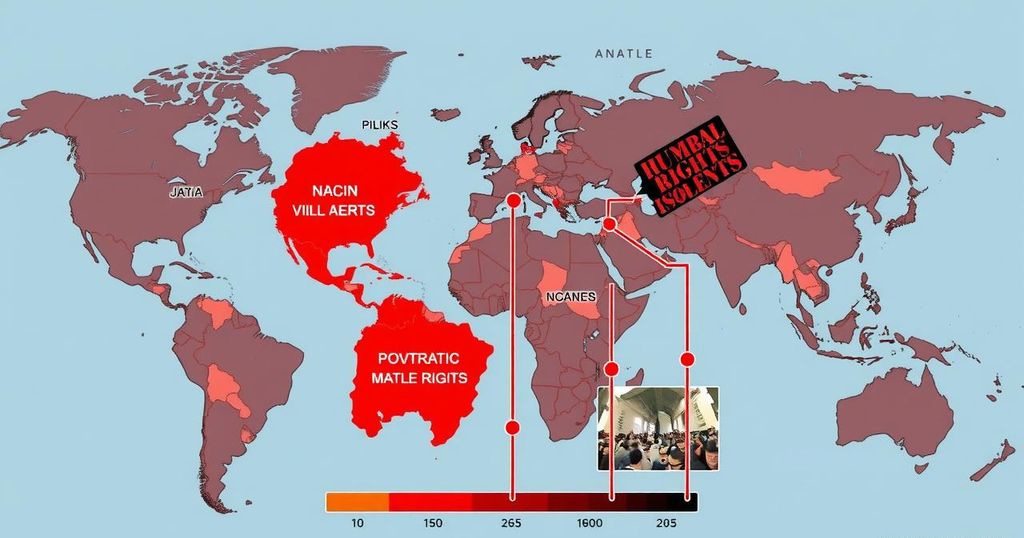Humanitarian Crises in Sudan, Myanmar, and the DRC: A Call for Action

The humanitarian crises in Sudan, Myanmar, and the Democratic Republic of the Congo (DRC) remain dire due to ongoing conflicts. In Sudan, civilian casualties and hunger escalate amid military confrontations. Myanmar faces a similar plight, struggling with systematic human rights violations amidst military control. Meanwhile, in the DRC, violence and exploitation linked to armed groups perpetuate a cycle of suffering, necessitating continuous peacekeeping efforts.
The 20-month-long conflict in Sudan continues to exacerbate a humanitarian crisis, causing extensive civilian suffering. The recent escalation between the Sudanese Armed Forces (SAF) and the Rapid Support Forces (RSF) resulted in significant civilian casualties, including at least 20 deaths from airstrikes. Notably, the UN reported over 782 civilian fatalities in Darfur since May 2024, with evidence suggesting the RSF’s actions may constitute genocide against specific ethnic groups.
Currently, over 24.6 million Sudanese face acute food insecurity, with reports of famine conditions worsening across several regions. The situation is dire, particularly in camps and localities in North Darfur, which are projected to deteriorate further. Furthermore, Edem Wosornu of the UN Office for the Coordination of Humanitarian Affairs highlighted the alarming disregard for international humanitarian law amidst escalating violence.
In Myanmar (Burma), persistent conflict between the military and ethnic resistance organizations (EROs) hampers efforts to conduct a comprehensive national census aimed at establishing a voter list for potential elections in 2025. Ongoing violence and human rights abuses have limited the military’s control over regions, and the exclusion of certain ethnic groups in the census raises concerns over widespread discrimination. The humanitarian crisis has left thousands, especially the Rohingya, vulnerable, with the UN projecting famine conditions imminently.
Simultaneously, the UN Security Council has renewed MONUSCO’s mission in the Democratic Republic of the Congo (DRC) amid escalating violence from the Allied Democratic Forces (ADF) and territorial gains by the March 23 Movement (M23). Attacks and human rights violations in eastern DRC have surged, resulting in significant civilian displacement and rising casualties. A proposal suggesting that major corporations, including Apple, may contribute to the crisis through supply chain practices underscores the need for robust corporate accountability in recognizing human rights abuses.
The international community must implement interventions to protect civilians in these troubled regions while ensuring accountability mechanisms are upheld, respecting the dignity and rights of all affected populations.
This article discusses ongoing conflicts in Sudan, Myanmar, and the Democratic Republic of the Congo (DRC), highlighting the humanitarian crises and human rights violations resulting from these wars. In Sudan, there is a severe escalation of violence between the SAF and RSF, leading to civilian casualties and widespread hunger. In Myanmar, the military’s systematic exclusion of ethnic populations threatens democratic processes and exacerbates the humanitarian situation. In the DRC, the violence and exploitation of natural resources by armed groups necessitate the continued presence of UN peacekeeping forces and increased scrutiny on corporate accountability concerning conflict minerals.
In conclusion, the prevailing conflicts in Sudan, Myanmar, and the Democratic Republic of the Congo underscore the urgent need for international intervention and adherence to humanitarian laws. The rising tide of violence against civilians and the exacerbation of humanitarian crises necessitate a concerted effort from the global community to safeguard human rights, ensure accountability, and facilitate humanitarian assistance. It is imperative that parties involved in these conflicts engage in sincere dialogues aimed at achieving durable peace and restoring rights to the affected populations.
Original Source: www.globalr2p.org








